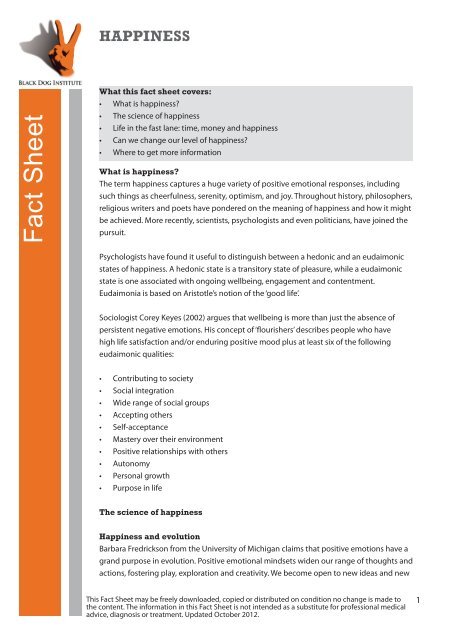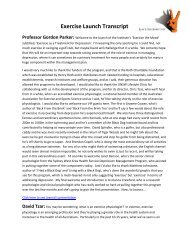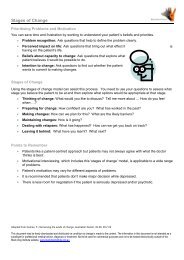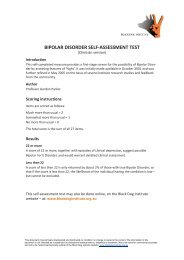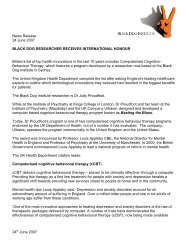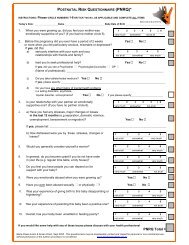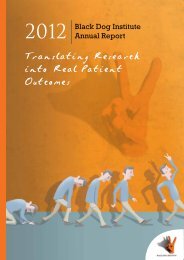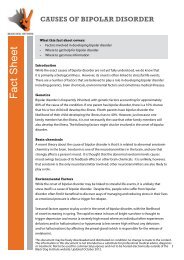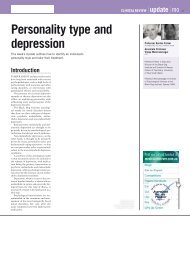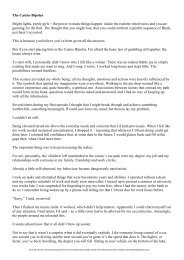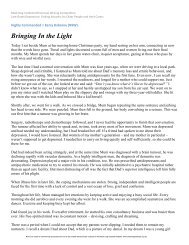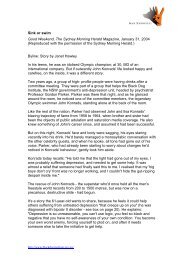Fact sheet: Happiness - Black Dog Institute
Fact sheet: Happiness - Black Dog Institute
Fact sheet: Happiness - Black Dog Institute
Create successful ePaper yourself
Turn your PDF publications into a flip-book with our unique Google optimized e-Paper software.
<strong>Fact</strong> Sheet<br />
HAPPINESS<br />
What this fact <strong>sheet</strong> covers:<br />
• What is happiness?<br />
• The science of happiness<br />
• Life in the fast lane: time, money and happiness<br />
• Can we change our level of happiness?<br />
• Where to get more information<br />
What is happiness?<br />
The term happiness captures a huge variety of positive emotional responses, including<br />
such things as cheerfulness, serenity, optimism, and joy. Throughout history, philosophers,<br />
religious writers and poets have pondered on the meaning of happiness and how it might<br />
be achieved. More recently, scientists, psychologists and even politicians, have joined the<br />
pursuit.<br />
Psychologists have found it useful to distinguish between a hedonic and an eudaimonic<br />
states of happiness. A hedonic state is a transitory state of pleasure, while a eudaimonic<br />
state is one associated with ongoing wellbeing, engagement and contentment.<br />
Eudaimonia is based on Aristotle’s notion of the ‘good life’.<br />
Sociologist Corey Keyes (2002) argues that wellbeing is more than just the absence of<br />
persistent negative emotions. His concept of ‘flourishers’ describes people who have<br />
high life satisfaction and/or enduring positive mood plus at least six of the following<br />
eudaimonic qualities:<br />
• Contributing to society<br />
• Social integration<br />
• Wide range of social groups<br />
• Accepting others<br />
• Self-acceptance<br />
• Mastery over their environment<br />
• Positive relationships with others<br />
• Autonomy<br />
• Personal growth<br />
• Purpose in life<br />
The science of happiness<br />
<strong>Happiness</strong> and evolution<br />
Barbara Fredrickson from the University of Michigan claims that positive emotions have a<br />
grand purpose in evolution. Positive emotional mindsets widen our range of thoughts and<br />
actions, fostering play, exploration and creativity. We become open to new ideas and new<br />
This <strong>Fact</strong> Sheet may be freely downloaded, copied or distributed on condition no change is made to<br />
the content. The information in this <strong>Fact</strong> Sheet is not intended as a substitute for professional medical<br />
advice, diagnosis or treatment. Updated October 2012.<br />
1
<strong>Fact</strong> Sheet<br />
HAPPINESS<br />
experiences. These states then help us create lasting personal resources, such as social<br />
connections and knowledge. We can draw on those resources during trying times.<br />
<strong>Happiness</strong> and the brain<br />
Neuroscientist Richard Davidson (2004) measured electrical activity in the prefrontal cortex<br />
area of the brain. He found that the left side is activated when people are feeling happy and<br />
that the balance of activity between right and left moves as mood changes. He studied<br />
the brain activity of Tibetan monks whose meditation training resulted in extremely high<br />
activity on the left side. In fact, Matthieu Ricard, a Buddhist monk and translator to the Dalai<br />
Lama, has been dubbed ‘the happiest man in the world’. The activity in his left<br />
prefrontal cortex was the highest ever measured.<br />
It’s not just highly trained Buddhist monks who benefit from meditation. Davidson gave<br />
meditation therapy to a group of highly stressed unhappy employees with high levels of<br />
right brain activity. Meditation increased activity in their left prefrontal cortex, employees<br />
felt happier and they reported renewed enthusiasm. Techniques such as meditation,<br />
relaxation, yoga and mindfulness therapy can boost activity in the left side of your<br />
prefrontal cortex leading to increased wellbeing (Davidson, Kabat-Zinn, Schumacher,<br />
Rosenkranz, Muller, Santorelli, Urbanowski, Harrington, Bonus & Sheridan, 2003).<br />
<strong>Happiness</strong> and our genes<br />
David Lykken, from the University of Minnesota, studied the role of genes in determining<br />
satisfaction in life. He gathered information on 4000 sets of twins and found that about 50%<br />
of one’s satisfaction with life comes from genetic predisposition (Lykken & Tellegen, 1996).<br />
However, neuroscientists have learnt that the brain is highly plastic and can rewire and<br />
change itself in response to life experiences.<br />
Memories and happiness<br />
Daniel Kahneman, from Princeton University, studies what makes experiences pleasant<br />
or unpleasant. When thinking about happiness, he says that it is important to recognise<br />
that life is a long series of moments. In any of those moments there is a lot going on and<br />
you could stop and ask, what is happening right now? We all have mental, physical and<br />
emotional activity at each of those points in time. However, almost all those moments are<br />
lost to us forever. We selectively keep memories and certain moments count more than<br />
others. We tend to hold onto beginnings, peak moments, and endings. For example, a<br />
parent might remember with great pleasure the day their child scored their first goal at<br />
sport. They’ll have forgotten the early start, the driving back and forth and the uneventful<br />
evening that accompanied that event.<br />
Health and happiness<br />
Numerous studies have shown that eudaimonic happiness is associated with longer life and<br />
This <strong>Fact</strong> Sheet may be freely downloaded, copied or distributed on condition no change is made to<br />
the content. The information in this <strong>Fact</strong> Sheet is not intended as a substitute for professional medical<br />
advice, diagnosis or treatment. Updated October 2012.<br />
2
<strong>Fact</strong> Sheet<br />
HAPPINESS<br />
superior health. In one study, monitoring 1,300 men over 10 years, Laura Kubzansky found<br />
that optimists had half the rate of heart disease. This research has shown that happy people<br />
are better at health maintenance, such as spending more time exercising and having<br />
routine check ups (Kubzansky, Sparrow, Vokonas & Kawachi, 2001).<br />
Life in the fast lane: Time, money and happiness<br />
Research has shown that there is no significant relationship between how much money<br />
a person makes and how happy they are. For example, Ed Diener, a psychologist at the<br />
University of Illinois, interviewed members of the Forbes 400 (the richest Americans),<br />
and found that they were only a tiny bit happier than the rest of the population (Diener,<br />
Horwitz & Emmons, 1985). Kasser and Ryan (1993) discovered that people for whom<br />
money, success, fame and good looks are especially important are less satisfied than those<br />
who strive for good relationships with others, develop their talents and are active in social<br />
causes.<br />
Researchers Brickman and Campbell studied a process called adaptation. They found that<br />
when we want something and then attain it, we don’t seem to be any better off. They called<br />
this the hedonic treadmill. It’s like we are walking on a treadmill but not really getting<br />
anywhere because we are adapting to things. They studied lottery winners and found that<br />
one year later, life satisfaction was not significantly greater for the winners. This process of<br />
adaptation explains why we are not significantly happier despite significant increases in the<br />
standard of living over the last 50 years.<br />
The slow movement<br />
The book ‘In Praise of Slowness: Challenging the Cult of Speed’ by Carl Honore (2005) is<br />
something of a handbook for an emerging ‘slow movement’. The ‘slow movement’ is a<br />
backlash against the idea that faster is always better. The idea is that by slowing down we<br />
can enjoy richer, fuller lives. It’s not about rejecting modern life, but rather striking a balance<br />
between fast and slow. That might mean making time for a hobby that slows you down or<br />
leaving some gaps in your day rather than striving to fill every moment with activity. Setting<br />
aside time where you turn off all technology or seeking out flexible working arrangements<br />
may also help you find balance. Some people make even more significant changes such as<br />
changing careers or locations. An Australian study by Hamilton and Mail (2003) found that<br />
over 90% of people who have made those significant changes are happy with their decision<br />
to downsize their lives.<br />
In Western countries, as GDP (Gross Domestic Product) has gone up, happiness levels have<br />
either stayed the same or have decreased. Are we ready for a new approach? A BBC poll has<br />
asked “should the government’s primary objective be the greatest happiness or the greatest<br />
wealth?” The greatest happiness was chosen by 81% respondents.<br />
This <strong>Fact</strong> Sheet may be freely downloaded, copied or distributed on condition no change is made to<br />
the content. The information in this <strong>Fact</strong> Sheet is not intended as a substitute for professional medical<br />
advice, diagnosis or treatment. Updated October 2012.<br />
3
<strong>Fact</strong> Sheet<br />
HAPPINESS<br />
In the Himalayan kingdom of Bhutan they have been measuring happiness levels in the<br />
population since 1972. They use their Gross National <strong>Happiness</strong> (GNH) level as a basis for<br />
making policy decisions. For example, they restrict tourism in order to preserve their culture<br />
and they banned smoking in 2004 in order to promote national wellbeing. Countries with high<br />
levels of income equality, like Scandinavian countries, have higher levels of wellbeing than<br />
countries with an unequal distribution of wealth, such as the United States.<br />
Can we change our level of happiness?<br />
David Lykken’s twin studies found that about 60% of our life satisfaction relates to either our<br />
genetic predisposition or our life circumstances (Lykken & Tellegen, 1996). Beyond that, he<br />
feels it is clear that we can change our happiness levels widely – up or down.<br />
Psychologist Martin Seligman became president of the American Psychological Association<br />
in 1998. During his term, he drew together the existing knowledge about the positive side<br />
of life and ignited the profession’s interest in finding out more. In his 2002 book, Authentic<br />
<strong>Happiness</strong>: Using the New Positive Psychology to Realize Your Potential for<br />
Lasting Fulfillment, Seligman draws on the research and outlines three ways to increase<br />
happiness; get more pleasure out of life, become more engaged in what you do and find ways<br />
of making your life feel more meaningful.<br />
See the <strong>Black</strong> <strong>Dog</strong> <strong>Institute</strong> fact <strong>sheet</strong> on Positive Psychology for practical strategies on<br />
how to increase happiness.<br />
Where to get more information<br />
Critiques of Materialism<br />
• Diener E., Horwitz J & Emmons, R A (1985). <strong>Happiness</strong> of the very wealthy. Social<br />
Indicator Research, 16, 263-274<br />
• Gittins R (2007). Gittinomics: Living the Good Life Without Money Stress,<br />
Overwork and Joyless Consumption. Allen and Unwin<br />
• Kassar T & Ryan R M (1993). A Dark Side of the American Dream: Correlates of<br />
Financial Success as a Central Life Aspiration. Journal of Personality and Social<br />
Psychology, 65 (2), 410-422<br />
History of <strong>Happiness</strong><br />
• Brickman P & Campbell D T (1971). Hedonic relativism and planning the good<br />
society. In M H Appley (Ed.) Adaptation level theory: A symposium. (pp. 287-302). New<br />
York: Academic Press<br />
• Darrin (2006). <strong>Happiness</strong>: A History. Atlantic Monthly Press<br />
• Haidt J (2005). The <strong>Happiness</strong> Hypothesis: Finding Modern Truth in Ancient<br />
Wisdom. Basic Books McMahon<br />
This <strong>Fact</strong> Sheet may be freely downloaded, copied or distributed on condition no change is made to<br />
the content. The information in this <strong>Fact</strong> Sheet is not intended as a substitute for professional medical<br />
advice, diagnosis or treatment. Updated October 2012.<br />
4
<strong>Fact</strong> Sheet<br />
HAPPINESS<br />
• Keyes, C L M (2002). The Mental Health Continuum: From Languishing to<br />
Flourishing in Life. Journal of Health and Social Behavior 43:207-222<br />
Science of <strong>Happiness</strong><br />
• Argyle M (2002). The Psychology of <strong>Happiness</strong>. Routledge<br />
• Davidson R J (2004.) What does the prefrontal cortex “do” in affect?:<br />
Perspectives in frontal EEG assymmetry research. Biological Psychology, 67,<br />
219-234<br />
• Davidson R J, Kabat-Zinn J, Schumacher J, Rosenkranz M, Muller D, Santorelli S F,<br />
Urbanowski F, Harrington A, Bonus K and Sheridan J F (2003). Alterations in Brain<br />
and Immune Function Produced by Mindfulness Meditation. Psychomatic<br />
Medicine, 65 (4), 564-570<br />
• Gilbert D (2007). Stumbling on <strong>Happiness</strong>. Vintage<br />
• Huppert F, Baylis N, Keverne B (2006). The Science of Wellbeing. Oxford University<br />
Press<br />
• Klein S (2006). The Science of <strong>Happiness</strong>. Avalon<br />
• Kubzansky L D, Sparrow D, Vokonas P & Kawachi I (2001). Is the Glass Half Empty<br />
or Half Full? A Prospective Study of Optimism and Coronary Heart<br />
Disease in the Normative Aging Study. Psychosomatic Medicine, 63, 910-016<br />
• Layard R (2006). <strong>Happiness</strong>: Lessons from a New Science. Penguin<br />
• Lutz A, Slagter H A, Dunne J D, Davidson R J (2008). Attention regulation and<br />
monitoring in meditation. Trends in Cognitive Sciences, 12(4), 163-169<br />
• Lykken D, Tellegen A (1996). <strong>Happiness</strong> Is a Stochastic Phenomenon.<br />
Psychological Science, 7 (3), 186-189<br />
• Lyubomirsky S (2007). The How of <strong>Happiness</strong>: A Scientific Approach to<br />
Getting the Life You Want. Penguin Press HC<br />
• Seligman, M E P (2002). Authentic <strong>Happiness</strong>: Using the new positive<br />
psychology to realize your potential for lasting fulfilment. Free Press<br />
The Buddhist Perspective on <strong>Happiness</strong><br />
• Cutler H C, Lama, Dalai (1998). The Art of <strong>Happiness</strong>: A Handbook for Living.<br />
• Riverhead Hardcover.<br />
• Ricard M (2007). <strong>Happiness</strong>: A Guide to Developing Life’s Most Important<br />
Skill. Little, Brown and Company<br />
Work-life Balance<br />
• Hamilton C & Mail E (2003). Downshifting in Australia: A sea-change in the<br />
pursuit of happiness. The Australia <strong>Institute</strong>, Discussion Paper 50<br />
• Honore C (2005) In Praise of Slowness: Challenging the Cult of Speed.<br />
HarperOne.<br />
This <strong>Fact</strong> Sheet may be freely downloaded, copied or distributed on condition no change is made to<br />
the content. The information in this <strong>Fact</strong> Sheet is not intended as a substitute for professional medical<br />
advice, diagnosis or treatment. Updated October 2012.<br />
5
<strong>Fact</strong> Sheet<br />
HAPPINESS<br />
Work-life Balance<br />
• Honore C (2005) In Praise of Slowness: Challenging the Cult of Speed.<br />
HarperOne.<br />
Useful Websites<br />
• Centre for Confidence and Well-being, Scotland - www.centreforconfidence.<br />
co.uk/<br />
• Time Magazine article: The New Science of <strong>Happiness</strong>. Jan 2005 - www.time.com/<br />
time/2005/happiness/<br />
• 6 Part BBC Series: The Science of <strong>Happiness</strong>. April 2006 - www.news.bbc.co.uk/2/<br />
hi/programmes/happiness_formula/<br />
• The University of Pennsylvania, Positive Psychology Centre www.ppc.sas.<br />
upenn.edu/index.html<br />
• An online resource for Martin Seligman’s book Authentic <strong>Happiness</strong>: Using the<br />
New Positive Psychology to Realize Your Potential for Lasting <strong>Happiness</strong>.<br />
The website includes questionnaires to help you identify your personal strengths and<br />
measure your current level of happiness: www.authentichappiness.sas.upenn.edu<br />
<strong>Black</strong> <strong>Dog</strong> <strong>Institute</strong><br />
Hospital Road, Prince of Wales Hospital, Randwick NSW 2031<br />
(02) 9382 4530 / (02) 9382 4523<br />
www.blackdoginstitute.org.au<br />
Email: blackdog@blackdog.org.au<br />
This <strong>Fact</strong> Sheet may be freely downloaded, copied or distributed on condition no change is made to<br />
the content. The information in this <strong>Fact</strong> Sheet is not intended as a substitute for professional medical<br />
advice, diagnosis or treatment. Updated October 2012.<br />
6


